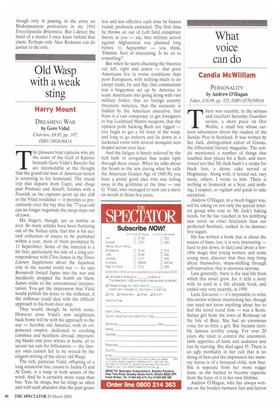Old Wasp with a weak sting
Harry Mount
DREAMING WAR by Gore Vidal Clairview, £9.95, pp. 197, ISBN 1902636414 The pleasure boat captains who ply the coast of the Gulf of Salerno beneath Gore Vidal's Ravello flat are inconsolable at the thought that the grand old man of American letters is returning to his homeland. The round trip that departs from Capri, and chugs past Positano and Amalfi, finishes with a flourish, as the captains point up the cliff to the Vidal residence — it perches so precariously over the bay that the 77-year-old can no longer negotiate the steep steps out of town.
His fingers, though, are as nimble as ever. So many articles have been fluttering out of the Italian eyrie that this is his second collection of essays to be published within a year, most of them prompted by 11 September. Some of the material is a bit thin, particularly his side of a long correspondence with Clive James in the Times Literary Supplement about the Japanese role in the second world war — he says Roosevelt forced Japan into the war and needlessly dropped the bomb on them; James sticks to the conventional interpretation. You get the impression that Vidal would publish his notes to the milkman, if the milkman could deal with the difficult approach to his front door step.
They would, though, be stylish notes. However cross Vidal's new neighbours back home will be with his approach to the war — horrible old America, with its oilpowered empire, dedicated to crushing commies and heathens abroad, imprisoning blacks and poor whites at home, all to secure tax cuts for billionaires — the literary ones cannot fail to be wooed by the elegant writing of the clever old Wasp.
The rich, patrician Vidal, offspring of a long senatorial line, cousin to Jackie 0 and Al Gore, is a wasp in both senses of the word. And he is certainly more wasp than bee. Yes, he stings, but he stings so often and with such abandon that the pain grows less and less effective each time he buzzes round, proboscis extended. The first time he throws an out of Left field conspiracy theory at you — say, that military action against Afghanistan was planned long before 11 September — you think, `Hmmm. Sort of interesting. Is he on to something?'
But when he starts chucking the theories out left, right and centre — that poor Americans live in worse conditions than poor Europeans, with nothing much to do except sizzle, fry and flip, that communism was a bogeyman set up by America to scare Americans into going along with vast military frolics, that no foreign country threatens America, that the economy is fiddled by the American executive, that Nato is a vast conspiracy to get foreigners to buy Lockheed Martin weapons, that the opinion polls backing Bush are rigged — you begin to get a bit tired of the wasp, and long to go indoors and lie down in a darkened room with several mosquito nets draped across your face.
And the fatigue is barely relieved by the rich bath of arrogance that soaks right through these essays. When he talks about the boom in the arts during what he calls the American Golden Age of 1945-50, you have a pretty good idea who was toiling away in the goldmine at the time — one G. Vidal, who managed to turn out a mere six novels in those five years.








































































 Previous page
Previous page